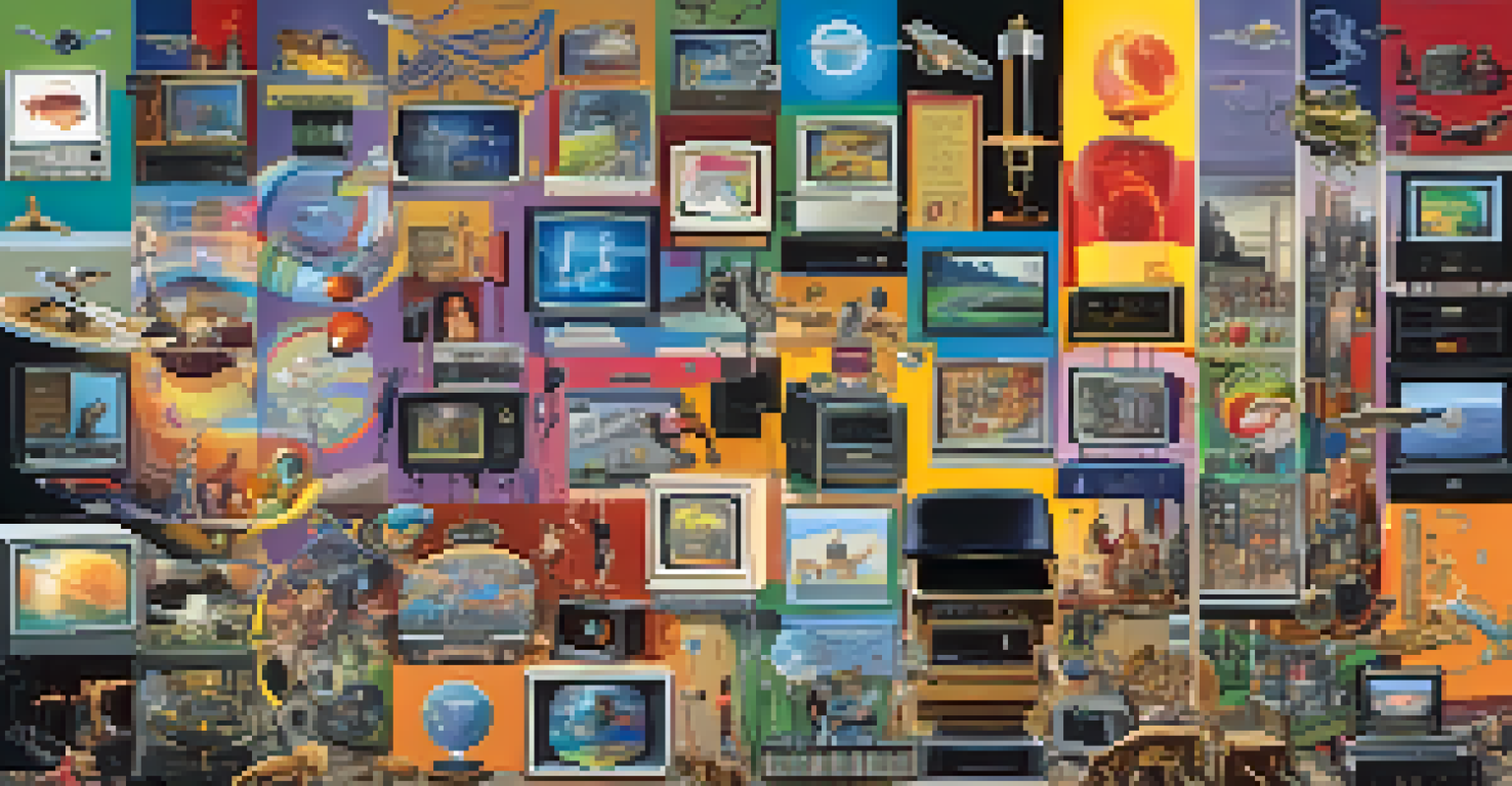The Impact of Hollywood Writers on Television Storytelling

Understanding the Role of Writers in TV Production
At the heart of every compelling television show lies the writer's pen. Writers are the architects of narratives, crafting plots and developing characters that resonate with audiences. They lay the groundwork for all aspects of the show, from dialogue to emotional arcs, which ultimately shape the viewer's experience.
The writer's job is to imagine everything, to make it real, and to bring it to life on the screen.
In many ways, television writers are like the unseen heroes of the industry. While actors may receive the spotlight, it is the writers who breathe life into the characters they portray. This essential role often goes unnoticed, yet their influence is felt in every episode, as they weave together the threads of a story.
Moreover, the collaboration between writers and other production teams is vital. Writers work closely with directors, producers, and actors to ensure that their vision is realized on screen. This synergy fosters a cohesive storytelling experience that captivates audiences and keeps them coming back for more.
Evolution of Television Storytelling Through the Years
Television storytelling has undergone significant transformations, reflecting societal changes and audience preferences. From the simplistic plotlines of early sitcoms to the intricate narratives of contemporary dramas, the evolution has been fascinating. Writers have played a pivotal role in this progression, adapting their craft to fit the times.

One notable shift is the rise of serialized storytelling, where plots span multiple episodes or even entire seasons. This format allows for deeper character development and more complex themes, attracting viewers who crave substance. Writers have embraced this model, creating rich, immersive worlds that draw audiences into their narratives.
Writers Shape TV Narratives
Writers are the unseen architects of television, crafting plots and characters that resonate deeply with audiences.
Additionally, the advent of streaming services has changed the game entirely. With the ability to binge-watch entire series, writers can craft longer, more elaborate stories without the constraints of traditional television scheduling. This has resulted in an explosion of creativity, with writers exploring fresh ideas and formats that push the boundaries of storytelling.
The Influence of Cultural Trends on Television Writing
Cultural trends significantly impact television writing, as writers often mirror and respond to the world around them. Social movements, technological advancements, and shifting norms are all reflected in the stories they tell. This responsiveness to culture helps keep television relevant and engaging for viewers.
Writing is a socially acceptable form of schizophrenia.
For instance, the rise of the #MeToo movement has led to more nuanced representations of gender and power dynamics in television. Writers are increasingly aware of the need to create authentic narratives that reflect diverse experiences. This shift not only enriches the storytelling but also fosters a greater understanding among audiences.
Moreover, as global connectivity increases, writers are drawing inspiration from various cultures and perspectives. This diversity in storytelling encourages a richer palette of narratives that resonate with a broader audience. Writers are now tasked with the challenge of creating inclusive stories that speak to an ever-evolving societal landscape.
The Power of Character Development in TV Shows
One of the most critical aspects of television storytelling is character development. Writers have the unique opportunity to explore the complexities of human nature through their characters. Well-crafted characters captivate audiences, allowing them to form emotional connections and invest in their journeys.
Through character arcs, writers can depict growth, transformation, and the struggles that come with them. For example, a character's descent into darkness or journey toward redemption can resonate deeply with viewers. These narratives often mirror real-life experiences, making them relatable and impactful.
Cultural Trends Influence Writing
Television writing reflects societal changes, as writers adapt stories to mirror cultural movements and diverse experiences.
Furthermore, ensemble casts present writers with the challenge of balancing multiple character arcs. This requires skillful storytelling to ensure that each character receives the attention they deserve while contributing to the overall narrative. The result is a rich tapestry of interconnected lives that keeps viewers engaged week after week.
Exploring Genre Influence on Television Writing
Different genres of television bring unique challenges and opportunities for writers. Whether it’s comedy, drama, or science fiction, each genre has its conventions that writers must navigate. Understanding these nuances allows writers to craft stories that not only entertain but also resonate with genre enthusiasts.
For example, in comedy shows, timing and punchlines are crucial. Writers must master the art of humor, often drawing from real-life situations to create relatable content. In contrast, dramatic writing requires a focus on emotional depth and tension, compelling writers to delve into the human experience.
Additionally, genre-blending has become increasingly popular, as writers experiment with mixing elements from different genres. This fusion creates fresh and exciting narratives that defy traditional categorization. By pushing the boundaries of genre, writers can engage audiences in new and unexpected ways, making television an ever-evolving art form.
Technology's Role in Shaping Modern Television Writing
Advancements in technology have transformed the landscape of television writing, offering new tools and platforms for creators. Writers now have access to advanced software that streamlines the writing process, enabling them to focus on creativity rather than logistics. This technological evolution has made it easier to bring complex narratives to life.
Moreover, the rise of social media has created a direct line of communication between writers and audiences. Writers can gauge viewer reactions and adapt their storytelling accordingly, fostering a sense of community around their shows. This interaction creates a dynamic environment where audience feedback can shape the narrative direction.
Character Development is Key
The depth of character development in TV shows allows viewers to form emotional connections, enhancing their engagement with the story.
Streaming platforms also offer writers unprecedented freedom in terms of content creation. With fewer restrictions on episode length and structure, writers can explore unconventional formats that challenge traditional storytelling norms. This flexibility encourages innovation and allows for the exploration of themes that may not have been feasible in conventional television.
The Future of Television Storytelling and Writers' Influence
As we look to the future, the role of writers in television storytelling will continue to evolve. With the rapid pace of societal change, writers will need to remain adaptable, embracing new storytelling techniques and platforms. This adaptability will be essential in creating narratives that resonate with an increasingly diverse audience.
Additionally, the ongoing challenge of representation in storytelling will be at the forefront of writers' minds. As more voices enter the industry, the focus will shift toward inclusive narratives that reflect the richness of human experience. This shift will not only enhance the quality of storytelling but also foster a deeper connection between viewers and the content they consume.

Ultimately, the impact of Hollywood writers on television storytelling is profound and far-reaching. Their creativity, adaptability, and understanding of cultural nuances will shape the television landscape for years to come, ensuring that stories remain relevant and engaging in an ever-changing world.